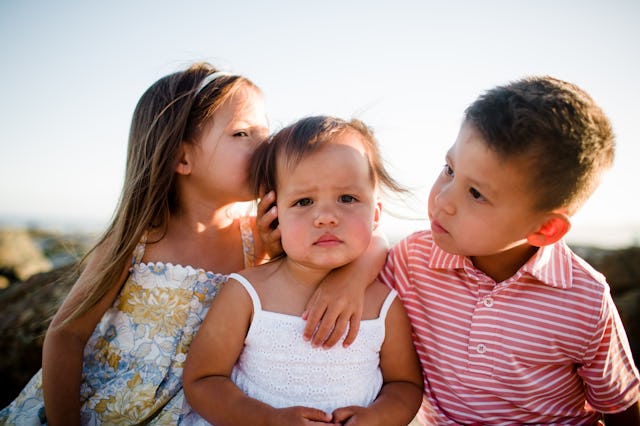Science Has Determined Which Sibling Gets In The Most Trouble
The results of this birth order study were "remarkably consistent."

There always seems to be one sibling that gets into more trouble than others. They get detention in school, sent home from the public pool for shenanigans, and might even have brushes with the law as teens or adults. And now researchers believe that birth order might play a significant role in why some kids have higher rates of delinquency than others.
In a newly revised working paper published in the National Bureau of Economic Research, scientists have found “remarkably consistent” data that second-born kids are significantly more likely to get into trouble than their older or younger siblings, regardless of how big the family is.
Joseph Doyle, an MIT economist, studied thousands of children from Denmark and Florida to figure out if birth order had any effect on the likelihood of a person engaging in trouble in school, juvenile delinquency, or adult crime. He and his colleagues used data from the first two children in families with two or more kids (siblings had to have the same mother and father, and twins were excluded) and focused on families in which the second-born child was a boy (since teen boys get in trouble more often than teen girls).
Read more: The Curse of the Second-Born Child
The research results were interpreted by Doyle to conclude that second-born boys from the study were more likely to face discipline at school or in the court system than first-born boys. According to Doyle, the tendency for the second-born subjects to be trouble-makers was more pronounced among pairs of brothers than when a sister was involved. The research also maintains that despite differences between Denmark and Florida in “socio-demographics as well as judicial systems, the effects of being born second are remarkably similar across the two locations.”
So what, if anything, could explain this supposed difference between first-born boys and second-born boys? And how is it their parents’ fault, because we’re sure that’s what’s coming next?
From the study: “We consider differences in parental attention as a potential contributing factor to the gaps in delinquency across the birth order.”
Ah, yes. There it is.
It all goes back to this presumed norm (or maybe myth?) that first-born children get all of their parents’ attention, while the second-born can go kick rocks. The researchers also speculate about another possible factor: in an interview with NPR, Doyle said, “The firstborn has role models, who are adults. And the second, later-born children have role models who are slightly irrational 2-year-olds, you know, their older siblings.”
Of course, no one should model their behavior after a 2 year old. Because if I go to the grocery store and start screaming that they’re out of the purple box of fruit snacks and only have the green box of fruit snacks, I’m probably going to be talking to a police officer.
Parents of two boys may rightly take issue with the study, if only based on their own experience. As Shankar Vendatam from NPR states, “This research, of course, is painting a broad picture. It doesn’t describe what’s happening in every single family.”
He’s right — this is just one study, and must be viewed in context and critically.
This article has been updated with new research findings.
This article was originally published on